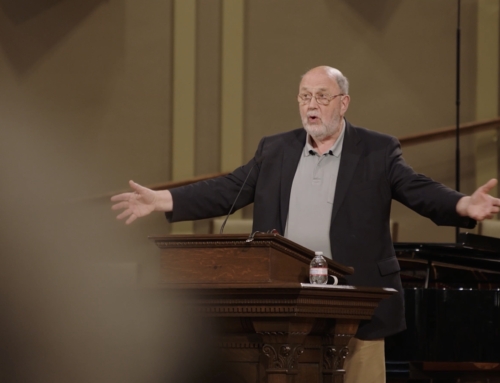In his Gifford lectures, published as History and Eschatology: Jesus and the Promise of Natural Theology, N.T. Wright narrates an intellectual history of theological failure. He describes how, following the Reformation and through the Enlightenment, one strand of ‘natural theology’ actually began to argue against the historical Christian understanding that Jesus Christ is the incarnate Son of God, instead favouring a description of God in terms of ahistorical abstractions. Without Jesus, the God of these particular natural theologians was no longer the God of Christian teaching, but a distant, Deist God who all too easily fades away into the completely removed-from-reality gods of the Epicureans.
Wright argues that some part of this failed development of natural theology should be traced to the exclusion of history as a viable category of natural theology. In contrast, Wright argues that the Christian, ‘who pray[s] that God’s kingdom will come and his will be done on earth as it is heaven’ [is] ipso facto committed to focusing on real life, real space-time-and-matter existence , not as an illustration of abstract truth but as the ultimate reality to which the best ‘abstract truths’ bear humble witness’ (74). In other words, Christianity only makes sense because ‘the word became flesh’ (122).
Taking this broader view of natural theology leads Christians both to affirmation of the truth of the revelation of Jesus Christ and secondly, a changed understanding of ourself, the world, and our role in it: that the world is being redeemed and all things are being made new. ‘The strange signposts we find in the present world, though in the dark of midnight they may seem to point nowhere or even to be some kind of sick joke are after all true, if broken, signposts to the ultimate realities of God and the world’ (213).
Does Natural Theology Matter?
In this blog post, I follow Prof. Wright’s lead in reading natural theology more expansively – going beyond apologetics alone – to consider further how natural theology itself might resource the life of the Christian disciple. To borrow Prof. Wright’s terms, do the broken signposts of natural theology offer anything of value when read in the light of a deeper understanding of God’s revelation to the world? If natural theology – meaning in this case God’s revelation through the created order – is not separated from God’s revelation through the church and scripture but read together with them, what should it add to the life of a Christian? In other words, for those who have crossed over Lessing’s ‘ugly broad ditch’ – whose questions are no longer epistemological or apologetic – does natural theology still matter?
My answer, in brief, is yes. I will note that this claim is not without critics, especially in the Reformed tradition following Calvin’s scepticism of the possibility of natural theology to provide anything beyond condemnation. However, I will not specifically address those critiques here. I want instead to turn to two constructive suggestions – one from scripture and one from St. Augustine – to argue that natural theology, understood as the observation of God in nature and discernment of God’s natural moral law, when read as complementary to revelation, should be understood as an important gift from God for the life of discipleship. Specifically, as we learn more about God through his creation – both the natural world and human nature – and read that knowledge through the lens of God’s revelation in scripture and the church, we come to share in God’s wisdom in a new way.
Acquiring Wisdom
The Wisdom books in scripture provide the model for this complementary approach of understanding God’s revelation in history and God’s revelation through the natural order as both contributing to the human being formed to partake in God’s wisdom. These authors take for granted that the most important mode of God’s revelation is through his special and direct revelation made in history to Moses and the people of Israel. It is through observing God’s laws, accepting God’s wisdom, that the people of Israel will ‘show your wisdom and understanding to the nations’ (Deuteronomy 4:6).
However, the people grow in wisdom through complementary engagement with the proclamation of God in nature as well as God’s self-revelation at Sinai. The so-called ‘Torah’ psalms, Psalm 19 and Psalm 119, provide a perfect example of this double contribution of God’s double law. In Psalm 19, the Psalmist draws the standard connection between God’s law and wisdom. ‘The law of the Lord is perfect, reviving the soul; the decrees of the Lord are sure, making wise the simple’ (Psalm 19:7). However, the Psalmist claims that this law, which ‘makes wise the simple’, is not simply given through revelation but also discerned in nature. The Psalmist describes the heavens as ‘proclaim[ing] the glory of God’. Without speaking verbally, they ‘pour forth speech’ and ‘declare knowledge’ (Psalm 19:2). Through encountering God’s law in this natural revelation a person can be transformed. They come to possess a ‘revived’ soul, a ‘rejoic[ing]’ heart, ‘enlightened’ eyes, a ‘wise’ reason, and the appropriate ‘fear of the Lord’ (Psalm 19:7-9).
Whereas the Psalmist describes a connection between wisdom and observation of God in nature, St. Augustine describes a connection between wisdom and the observation of the requirements of human nature, which is equally part of God’s natural creation. He defines the wise person as the one who not only knows God’s law, but also possesses ‘the knowledge of changeable and temporal things that is needed for the conduct of the business of this life’ (City of God, XII.17). The wise person does not walk away from these natural needs and demands or pretend they don’t exist. Rather, the wise person interprets them in light of God’s revealed eternal truth and therefore seeks to use them in a way which properly directs them ‘to the highest good as their end’ (XII.17).
The natural goods which satisfy these natural desires are not in themselves bad, but gain their true value when they are properly ordered to direct us to the eternal good of relationship with God. The most important of these natural goods, as we see in Augustine’s own life, is friendship. Although Augustine at times struggles with pursuing his friends to satisfy his own desires, the best friendships he experiences are those which are key to leading him to God and, after his conversion, continue to be part of his own continued conversion and growth. Although these natural desires and the goods which fulfil them are dangerous when valued for their own sake, the proper pursuit of them can actually even teach us about God. For Augustine, the wise Christian should therefore both seek to live according to God’s revelation through scripture and according to the properly ordered discernment of human nature: natural theology
Pointing Towards God
What does this leave us? Without the guidance of God’s revelation in history, it is easy to see how quickly knowledge gained through God’s creation could turn to worship of that creation rather than understanding it as a pointer to God. In a similar way, Augustine often reminds us that loving the goods of this world simply for their own sake can become corrupting and consuming, pointing us away from God rather than towards him.
However, when seen through the prism of God’s direct revelation, natural theology can lead us into exactly the type of engagement with God’s law which enables growth in wisdom. The wisdom gained may be simple: the humble awareness of our finitude and smallness; or transcendent: the startling discovery of the beauty lying behind the order of God’s creation. That same beauty that, whether discerned in the natural world or in the love of our friends, was revealed in God’s moral law given to Moses and perfected, most clearly, in Jesus Christ.
Want to Learn More About Natural Theology? Prof. Wright’s course Knowing God in the Created World releases August 18th, 2022. Watch the introduction below.
Elisabeth Kincaid
Latest posts by Elisabeth Kincaid (see all)
- What Natural Theology Can Do For You - August 13, 2022







